What's New
Displaying results 411 - 420 of 4913
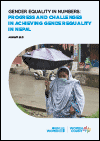
Resource | Publications,
The Gender Equality in Numbers report consolidates available data on key gender-related Sustainable Development Goal indicators and the minimum set of gender-related indicators for Nepal. It provides an overview of commitments to gender equality and women’s empowerment and key statistics in population demographics, health, education, leadership, labour and economic empowerment, poverty reduction and ending all forms of gender based violence. This will serve as a key tool for policymakers and gender equality advocates in government, civil society, and international organizations to advocate for further advances in gender equality.
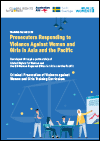
Resource | Publications,
The purpose of this Training Package is to build the capacity of prosecutors on providing quality and holistic responses to survivors of violence, and to better understand survivor’s perspectives, experiences, to bring them justice and address their needs. The goal of this training is that gender-transformative, trauma informed and survivor-centered approaches are utilized in prosecution and that gender biases are addressed, to ensure that the legal system supports survivors of violence against women in a respectful and empowering way. The Curriculum includes common key principles and considerations for all prosecutors working with survivors of violence, and includes practical step-by-step instructions for trainers, as well as exercises, and handouts with case studies.

Resource | Publications,
The United Nations Sustainable Development Cooperation Framework (“Cooperation Framework”) is an agreement between the UN and the host government and determines a country’s development priorities as well as the UN development system’s contributions to them. As AMR hinders progress in many of the Sustainable Development Goals (SDGs), coordinated action across UN organizations and government agencies is needed to effectively tackle AMR across all sectors. A new guidance for UN country teams builds the case for AMR as a development issue and component of broader issues such as One Health, UHC and health security, food systems and planetary health: it aims to establish AMR as a higher priority on the policy and development agenda; stimulate multi-stakeholder interest; and attract funding.
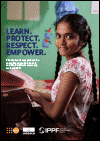
Resource | Publications,
Comprehensive Sexuality Education (CSE) is a curriculum-based process of teaching and learning about the cognitive, emotional, physical and social aspects of sexuality. It goes beyond simply providing education about reproduction, risks and diseases by also addressing positive sexuality and relationships, and the broader sociocultural and gender influences on sexual and reproductive health, with an emphasis on developing life skills. School-based age-appropriate CSE is an effective means of reaching a large population of children and young people, particularly where rates of school participation are high. This overview of the status of in-school CSE in Asia and the Pacific provides a strong evidence base on the reach and impact of this across the region.
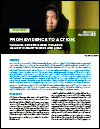
Resource | Publications,
This policy brief explores the ways in which being a migrant accentuates the risks of women and girls to various forms of gender-based violence at all stages of migration and examines how this has been exacerbated by the COVID-19 pandemic. The brief concludes with a set of recommendations on how to reduce the risks of gender-based violence and improve the provision and coordination of essential services for women and girls.
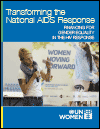
Resource | Publications,
The impact of gender inequality on the HIV response efforts is widely acknowledged, yet, efforts to rectify this are lagging. UN Women, with the United Nations University International Institute for Global Health, convened an Expert Group Meeting on financing for gender equality in the HIV response and commissioned seven discussion papers to identify existing gaps and map recommendations for action.
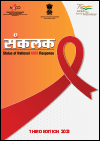
Resource | Publications,
The 'Sankalak' provides the epidemic status and programmatic reach across prevention, testing, treatment and retention continuum in he challenging context of COVID-19 pandemic in year 2020-21. This document highlights the results of country efforts in maintaining and augmenting the AIDS response through State and National-level initiatives.
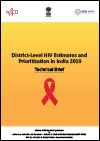
Resource | Publications,
Focus on location and population is fundamental to an efficient AIDS response. HIV Estimates 2019 report provides vital epidemiological evidence to the programme managers at all levels for prioritization of locations for bottom-up AIDS response. The report identifies 144 districts where either the adult HIV prevalence is ≥1% or the size of people living with HIV (PLHIV) is ≥5000. Together, these 144 districts are estimated to have 63% of PLHIV, 49% of new infections and 55% of PMTCT need in 2019. This is a critical piece of evidence for planning, consolidating and expanding services across the prevention–detection– treatment continuum putting people at the centre, and the prioritization of locations where investments in AIDS response can do more people more good.

Resource | Publications,
Each year more than USD 100 billion is estimated to be spent on global drug law enforcement. This is over 750 times the amount allocated to harm reduction services for people who use drugs. Despite overwhelming evidence in favour of following a health and human rights-based approach to drug control, governments around the world, including many in Asia, continue to prioritise punitive responses to drugs.
This approach has deterred, and in some cases prohibited, people who use drugs from accessing health and social services. It has also fuelled mass incarceration, extrajudicial killings, torture, the use of the death penalty, discriminatory policing and the stigmatisation of people who use drugs.

Resource | Publications,
Molecular HIV surveillance (MHS) is an umbrella term that describes a wide range of practices focused on the monitoring of HIV variants and the differences and similarities between them for scientific research, public health surveillance and intervention.
This briefing paper was developed for people living with HIV, activists, legal experts, and human rights campaigners to understand the complexities and consequences of MHS – a growing research and public health surveillance practice that has concerning implications for human rights.





